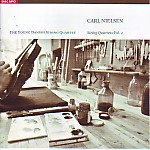As with Volume 1 in this series, these are excellent performances. The works themselves are early, but Nielsen’s energy and formal confidence are strikingly refreshing, even if the melodic style isn’t as distinctive as it would become later. The first movement of the F minor quartet does feature some remarkable chromatic harmony, though, while the E-flat major quartet of 1898 reveals the composer of the First Symphony well on his way to the Second. It’s a splendid work that deserves to be much better known.
The Young Danish Quartet, as the name suggests, brings a youthful enthusiasm to the music that’s very compelling. Occasionally, in the outer movements of both works, they bear down a bit too hard on their instruments resulting in some percussive sound effects, but this isn’t a major problem–and better more excitement rather than less. Certainly they sustain the slow movements with impressive intensity, and they find perfect tempos for the E-flat quartet’s Allegretto Pastorale third movement (with its Presto trio). Vivid sonics in both SACD and normal stereo add to the impact of the performances. Strongly recommended!
































